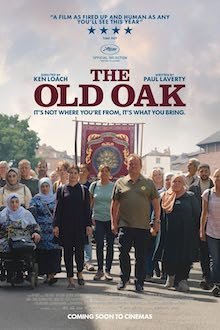Direction: Ken Loach
Country: UK
Ken Loach is an English director whose work we respected in full. His new drama, The Old Oak, is realism pushed to tears, a minor opus that deals with two topics: impoverishment in former mining towns and the arrival of Syrian refugees. How finely Loach has woven these thematic threads?
While not packing the same punch as I, Daniel Blake (2016) or Sorry We Missed You (2019), the film intersperses lukewarm and powerful moments, evincing a softness that occasionally leans on pathos and sentimentality, diluting the impact of the narrative. Set in Durham, the story introduces Yara (Ebla Mari), a Syrian refugee with a passion for photography, who arrives in town just to be unconsoled with a broken camera and a less-than-welcoming reception. Already underwhelmed by crisis, some locals develop an unfounded xenophobia that translates into hate, lies, and betrayal. But there’s also kindness and compassion, which especially apply to TJ Ballantyne (Dave Turner), the broken yet goodhearted owner of The Old Oak, the sole pub in town, in urgent need of repairs.
Paul Laverty’s screenplay doesn’t come with major surprises, while Loach’s direction is quietly effective as if the camera wasn’t there. Although navigating predictable territory, they keep tackling social issues deeply rooted in our time and transporting them to the screen with a naturalistic Emile Zola-like approach. It’s a lucid film that, hitting where is necessary, ends up uneven. The optimistic path may touch the viewers’ hearts, but the full complexity of the subject is not there. Yara is reduced to a functional role, her words of lament feeling more superficial than deep. Our hearts go to TJ, not Yara, a consequence of the film’s vulnerabilities.
The pair Loach / Laverty, who has been working together since 1996, leaves us at the doorstep of an intercultural consolidation one can only dream of. The intentions are noble but The Old Oak doesn’t really come off despite the painful dramas behind each character.








